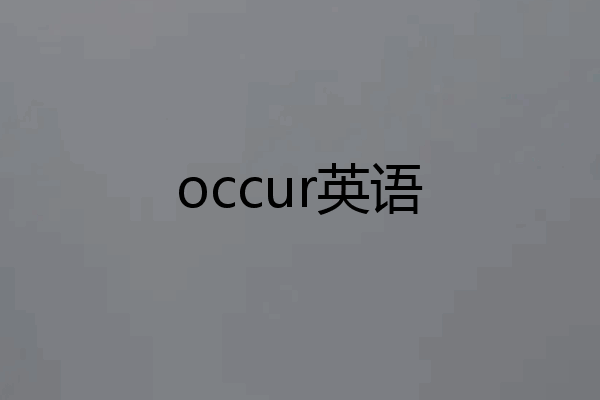
WZYHJM1021
过去式:occurred。过去分词:occurred。occur,英语单词,主要用作不及物动词,意为“发生;出现;存在”。
v.发生; 出现; 存在于; 出现在;
[例句]We need to know the exact time the incident occurred.
我们需要了解事情发生的确切时间。
第三人称单数:occurs
现在分词:occurring
过去式:occurred
过去分词:occurred
It can occur on one or both sides.
它可以发生在一个或双方。
Why do they occur?
它们为什么会出现?
In this example, you want the three to occur one after the other.
在这个示例中,您想让这三个操作一个接一个地发生。


小花lily
occur,英语单词,主要用作不及物动词,意为“发生;出现;存在”。所以occuron只有在on和in时间上的区别1、 表示在较长的时间里(如周/月份/季节/年份/世纪等)。如:in a week; in May; in spring/summer/autumn/winter; in 2008; in the 1990’s等。 表示在上午、下午或晚上。如:in the morning/afternoon/evening。in the daytime(在白天) 属于固定搭配,指从日出到日落这一段时间,反义词组是in the night。“in + 一段时间”表示“多久以后/以内”,常与将来时连用。如:in half an hour; in ten minutes; in a few days等。2、表示在具体的某一天(如日期、生日、节日或星期几)。如:on May 4th,1919;on Monday; on Teachers’Day;on my birthday;on that day等。表示某一天的上午、下午或晚上。如:on the morning of July 2; on Sunday afternoon; on a cold winter evening等。

MrStoneLiu
1. occur vi.发生, 出现 解析:【同】happen, take place 【衍】occurrence n.发生 【辨析】happen强调偶然性 There happen to be no money with me. It so happens that... take place指有计划的使某事发生 Great changes have taken place in my hometown. occur则包括了以上二者的意义,比较含糊。 2. occur是一般用词,可指某事情偶然发生或者按照计划进行,在表示具体失去的名词作主语的时候,可与happen换用,但比较正式,跟to短语时,表示“想到”,而不是“发生”,比如 I’m very sorry for all happened to you. An idea occurs to me that going to Switzerland for traveling will be marvelous! 有一本书就是探究这两个词的差异性的,能在线阅读: